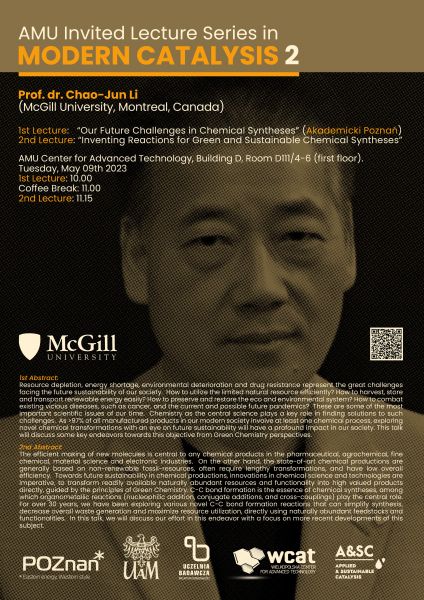Serdecznie zapraszamy na dwa wykłady, które odbędą się we wtorek, 9 maja 2023 roku w Centrum Zaawansowanych Technologii. Jeden w ramach cyklu AMU Invited Lecture Series in MODERN CATALYSIS 2, drugi organizowany jest z programu Akademicki Poznań, finansowanego przez miasto.
Tym razem do Poznania przyjeżdża prof. dr. Chao-Jun Li z McGill University w Montrealu w Kanadzie.
Wykład odbędzie się w Centrum Zaawansowanych Technologii, sala seminaryjna D-111/4-6
Wtorek, 9 maja 2023
10.00 - Our Future Challenges in Chemical Syntheses (wykład w ramach Akademickiego Poznania)
11.00 – Przerwa kawowa
11.15 - Inventing Reactions for Green and Sustainable Chemical Syntheses (wykład w ramach cyklu AMU Invited Lecture Series in MODERN CATALYSIS 2)
Prof. dr. Chao-Jun Li jest naukowcem niezwykle rozpoznawalnym na świecie. Opublikował imponującą liczbę artykułów - ponad 500, 8 książek, 14 patentów. Jego prace cytowane były ponad 51 000 razy, a aktualny indeks Hirscha wynosi 109. Prof. Li wygłosił około 500 wykładów plenarnych oraz na zaproszenie na międzynarodowych konferencjach i w instytucjach badawczych na całym świecie. Li otrzymał wiele międzynarodowych i prestiżowych wyróżnień m.in. Medal Chemical Insitute of Canada (2022), Humboldt Research Award (2021), Killiam Research Fellow (2018), Claritive Analytics uznała go jako jednego z najczęściej cytowanych naukowców na świecie (2017), został również wybrany na członka Europejskiej Akademii Nauk (2020) i Chińskiego Towarzystwa Chemicznego (2020). Pełni też rolę edytora w Chemical Communications (od 2020) i Green Chemistry (2005-) oraz zasiada w radach doradczych takich prestiżowych czasopism jak ACS Catalysis (od 2021), Chemical Society Reviews (2016-), Chemical Science (2010-).
Chao-Jun Li received his BSc at Zhengzhou University (1983), MS at the Chinese Academy of Sciences in Beijing (1989) and his Ph.D. (with honor) at McGill University (1992) under the direction of T. H. Chan and D. N. Harpp. Then, Li spent two years (1992– 94) as an NSERC Postdoctoral Fellow in Barry M. Trost's laboratory at Stanford University (US), and following that went to Tulane University (US) as an assistant professor. He was promoted to associate professor with tenure in 1998 and full professor in 2000. In 2003, he became a Canada Research Chair (Tier I) in Green Chemistry and a Professor of Chemistry at McGill University in Canada. He is an honorary research professor at the Chemistry Institute of the Chinese Academy of Science (1996–) and a guest professor at the University of Science and Technology in China (2001). He was a visiting professor (with Robert G. Bergman) at University of California at Berkeley (2002). He has also beenthe director of NSERC CREATE for Green Chemistry (2012–2018), the director of CFI Infrastructure for Green Chemistry and Green Chemicals (2008–2018) and has been the co-director of the FQRNT Center for Green Chemistry and Catalysis since 2009. Li serves as a associate editor in Chem. Commun. (since 2020) and Green Chem. (2005-) and sits in Editorial Advisory Boards of e.g., ACS Catal. (since 2021), Advanced Sustainable Systems (Wiley, 2021-), Chem. Soc. Rev. (2016-), Chem. Sci. (2010-) His research is focusing on exploring new fundamental reactions that can drastically shorten synthetic steps, more directly transform renewable biomass and abundant feedstocks (CO2 and methane) into high valued products, and harvest solar light by chemical means and utilize photo-energy as energy input for chemical conversion. He has published over 500 publications, 8 books, 14 patents (total citations: 51 190, H- index = 109). He gave around 500 plenary, keynote and invited talks at international conferences and research institutions. Li was awarded with many honors and distinctions, e.g., Chemical Insitute of Canada Medal (2022), Humboldt Research Award (2021), Killiam Research Fellow (2018), Listed as one of the World Most Highly Cited Scientists by Claritive Analytics (2017). He was elected as Fellow of the European Academy of Science (2020) and Chinese Chemical Society (2020).


